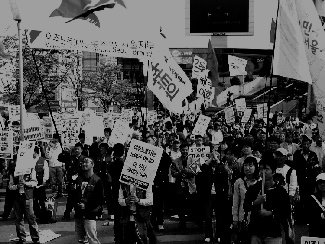Remarks on the occasion of the International Migrants' Day on December 18th
Dear Prime Minister Chung Un-chan
As one of the first countries in Asia, the Republic of Korea has introduced a comprehensive legal framework protecting the rights of migrant workers. Under Korean law, migrant workers enjoy the same labour rights as their South Korean colleagues. Nonetheless, a recent report by Amnesty International on "Disposable labour: Rights of migrant workers in South Korea"(ASA 25/001/2009) illustrates that migrant workers are still exposed regularly to severe human rights abuses.
Even though protected by formal labour rights, many migrant workers cannot invoke those rights because of fear of reprisals from employers, language barriers and shortage of staff in job centers and labour offices. In particular, regulations and restrictions on changing jobs make migrant workers vulnerable to exploitation. Migrants do not dare to raise issues of abuse in the workplace, such as denial of overtime pay or sexual harassment or violence, as they are fully dependent on their current employer.
The Amnesty International report, furthermore, documents intances of arbitrary arrests and violations of law enforcement procedures, including in some cases excessive use of force. Moreover, the conditions in some detention facilities do not meet international standards such as Standard Minimum Rules for the Treatment of Prisoner and the Body of Principles for the Protection of All persons Under Any Form of Detention or Imprisonment.
The Republic of Korea has made significant advancements in the legal protection of migrant workers' rights. Nonetheless, human rights violation still occur frequently. Therefore, further efforts have to be made to extend the legal protection of migrant legislation protecting the rights of migrant workers.
Therefore, on behalf of the German Metalworkers' Union IG Metall, representing 2.3million workers, and on behalf of the International Metalworkers' Federation(IMF), representing 25million metalworkers worldwide, I call on the Korean Government,
(1) to ratify and implement the International Convention on the Protection of the Rights of All Migrant Workers and Members of their Families and the four fundamental ILO Conventions: no 87(freedom of association and protection of the right to organise); no 98(right to organise and collective bargaining); no 29(forced or compulsory labour); and no 105(abolition of forced labour)
(2) to address the lack of labour mobility of migrant workers which is a major reason for their exploitation by their employers(including amendment of Article 25 of the EPS Act in order to remove the restrictions on the number of times migrant workers can change jobs),
(3) to ensure that procedures for the arrest, detention and deportation of irregular migrant workers are in line with international human rights standards, and
(4) to ensure that conditions of detention are consistent with international human rights law and standards including Standard Minimum Rules for the Treatment of Prisoner and the Body of Principles for the Protection of All persons Under Any Form of Detention or Imprisonment.
Sincerely,
Berthold Hüber
President of IG Metall
President of the International Metalworkers' Federation(IMF)




